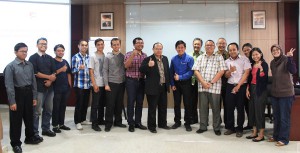 Dr. Bhakti Stephan Onggo presented Research using Agent-Based Modeling: Making a Contribution to Science at SBM ITB Jakarta Campus (5/09/2015). This public lecture addressed issues surrounding the use of agent-based simulation in business and management research. “What is model in management school or in a business context, the model has to be an external and explicit. Model is some tangible, something that we cannot discuss so it can be in a form of computer program, it can be in a form of drawing hand and paper.
Dr. Bhakti Stephan Onggo presented Research using Agent-Based Modeling: Making a Contribution to Science at SBM ITB Jakarta Campus (5/09/2015). This public lecture addressed issues surrounding the use of agent-based simulation in business and management research. “What is model in management school or in a business context, the model has to be an external and explicit. Model is some tangible, something that we cannot discuss so it can be in a form of computer program, it can be in a form of drawing hand and paper.  Dr. Bhakti Stephan Onggo presented Research using Agent-Based Modeling: Making a Contribution to Science at SBM ITB Jakarta Campus (5/09/2015). This public lecture addressed issues surrounding the use of agent-based simulation in business and management research. “What is model in management school or in a business context, the model has to be an external and explicit. Model is some tangible, something that we cannot discuss so it can be in a form of computer program, it can be in a form of drawing hand and paper.
Dr. Bhakti Stephan Onggo presented Research using Agent-Based Modeling: Making a Contribution to Science at SBM ITB Jakarta Campus (5/09/2015). This public lecture addressed issues surrounding the use of agent-based simulation in business and management research. “What is model in management school or in a business context, the model has to be an external and explicit. Model is some tangible, something that we cannot discuss so it can be in a form of computer program, it can be in a form of drawing hand and paper. Definition by Pidd 2009 model is an external and explicit representation of part of reality as seen by the people who wish to use that model to understand, to change, to manage and to control that part of reality,” said Bhakti Stephan Onggo lecturer and assistant professor in the Department of Management Science at Lancaster University Management School (LUMS).
Definition by Pidd 2009 model is an external and explicit representation of part of reality as seen by the people who wish to use that model to understand, to change, to manage and to control that part of reality,” said Bhakti Stephan Onggo lecturer and assistant professor in the Department of Management Science at Lancaster University Management School (LUMS).
In this public lecture Dr. Bhakti Stephan Onggo explain that Simulation model is use especially when we are dealing with a complex system because if we are not dealing with a complex system we just need a simple model. What I mean with a complex system is numbers of components, complex, rules and interaction, if one of them is missing is not a complex system. Simulation Model is a model in which the solution is derived numerically rather than analytically, usually used to represent:
- Complex system (components, complex, rules, interactions)
- Dynamic
- Stochastic behavior
- Transient and steady state behavior
Simulation modeling paradigms:
- Discreate-event simulation
- Represent the world as a set of queues and activities
- Track entities from their arrival in the system until they leave the system
- Agent-based simulation
- Represent the world as a set of interacting agents
- Agenda are more complex than entities in DES
- System dynamics
- Represent the world as a set of interacting levels and flows
- Focus on population of entities and the states of entities moving from one place to another
Followed with a discussion on four methodological positions that is relevant for simulation modeling (rationalism, empiricism, positivism and critical realism) and after that continued by discuss how different reasoning types (deduction, induction and abduction) are used in simulation modeling Dr. Bhakti Stephan Onggo receipts so many question from the public lecture participants consist of lecturer, MBA and DSM students and alumni.
 Definition by Pidd 2009 model is an external and explicit representation of part of reality as seen by the people who wish to use that model to understand, to change, to manage and to control that part of reality,” said Bhakti Stephan Onggo lecturer and assistant professor in the Department of Management Science at Lancaster University Management School (LUMS).
Definition by Pidd 2009 model is an external and explicit representation of part of reality as seen by the people who wish to use that model to understand, to change, to manage and to control that part of reality,” said Bhakti Stephan Onggo lecturer and assistant professor in the Department of Management Science at Lancaster University Management School (LUMS).
In this public lecture Dr. Bhakti Stephan Onggo explain that Simulation model is use especially when we are dealing with a complex system because if we are not dealing with a complex system we just need a simple model. What I mean with a complex system is numbers of components, complex, rules and interaction, if one of them is missing is not a complex system. Simulation Model is a model in which the solution is derived numerically rather than analytically, usually used to represent:
- Complex system (components, complex, rules, interactions)
- Dynamic
- Stochastic behavior
- Transient and steady state behavior
Simulation modeling paradigms:
- Discreate-event simulation
- Represent the world as a set of queues and activities
- Track entities from their arrival in the system until they leave the system
- Agent-based simulation
- Represent the world as a set of interacting agents
- Agenda are more complex than entities in DES
- System dynamics
- Represent the world as a set of interacting levels and flows
- Focus on population of entities and the states of entities moving from one place to another
Followed with a discussion on four methodological positions that is relevant for simulation modeling (rationalism, empiricism, positivism and critical realism) and after that continued by discuss how different reasoning types (deduction, induction and abduction) are used in simulation modeling Dr. Bhakti Stephan Onggo receipts so many question from the public lecture participants consist of lecturer, MBA and DSM students and alumni.



